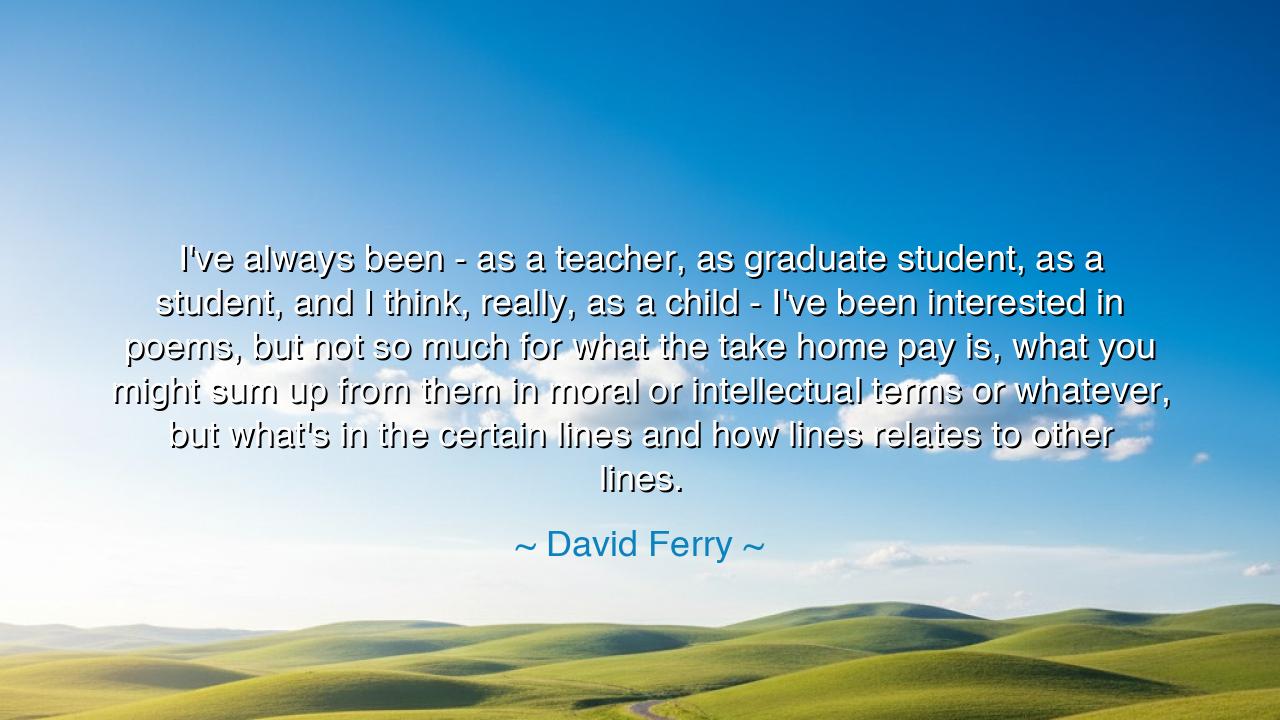
I've always been - as a teacher, as graduate student, as a
I've always been - as a teacher, as graduate student, as a student, and I think, really, as a child - I've been interested in poems, but not so much for what the take home pay is, what you might sum up from them in moral or intellectual terms or whatever, but what's in the certain lines and how lines relates to other lines.






Hear the voice of David Ferry, poet and scholar, who said: “I’ve always been—as a teacher, as a graduate student, as a student, and I think, really, as a child—I’ve been interested in poems, but not so much for what the take-home pay is, what you might sum up from them in moral or intellectual terms or whatever, but what’s in the certain lines and how lines relate to other lines.” These words are not casual—they are a testament to how art is to be approached: not as a tool for extracting moral profit, but as a living experience, a weaving of words that breathes its power through connection and resonance.
The teacher in him, the student, and even the child are united in this confession. For the child marvels without needing to explain, the student seeks to discover, and the teacher seeks to pass on. Ferry reveals that what endures through all these stages is not the demand for moral lessons or neat conclusions, but the awe of the poem itself, line by line, rhythm by rhythm, sound answering sound. In this, he returns us to the sacred origins of poetry—not as instruction, but as music, enchantment, and revelation.
Consider the lines he speaks of: each one a thread, and together they weave a tapestry greater than the sum of its parts. To focus only on the “take-home pay,” the lesson one might quickly extract, is to miss the very soul of poetry. For the meaning of a poem is not always in what it says directly, but in how its words converse with one another, how silence between them hums, how echoes ripple through the heart of the reader. Poetry is not a sermon, but a song.
The ancients knew this truth well. When Homer’s epics were sung in firelit halls, no one rose afterward to calculate what moral they had gained. The power lay in the cadence, in how one line led to another, in the thunder of the hexameter, in the way a single phrase could linger like a charm in the memory. And even in sacred texts—the Psalms, the Bhagavad Gita, the Tao Te Ching—the enduring power is not merely in the ideas they contain, but in the beauty of the words themselves, how they are placed, how they call to one another across the page.
History offers another example in Emily Dickinson, whose fragments and compressed verses puzzled those who sought neat conclusions. She did not write to teach but to sing, each line vibrating with its own energy, each word chosen with the intensity of a flame. The world came, in time, to realize that the power of her poetry was not in its summary, but in its resonance—exactly what Ferry proclaims.
The meaning of Ferry’s words is therefore clear: the value of poetry, and of art itself, is not in what it can be reduced to, but in what it resists being reduced to. The lines are not commodities, but living things, and their beauty lies in their relationships, in the music they make together. To read for “take-home pay” is to strip the art of its mystery; to read for wonder is to encounter the soul of the poet and, perhaps, the soul of humanity.
The lesson for us is this: do not approach art only with the desire to extract, as if it were a mine to be emptied. Approach it as a garden, to be walked through, admired, and returned to again and again. When you read poems, do not rush to ask, “What does this mean for me?” Instead, dwell in the words themselves, notice how a phrase catches light from another, how the music of one line shapes the next. Learn to savor, not to consume.
So let David Ferry’s words endure: “What matters is what’s in the certain lines, and how lines relate to other lines.” Remember this when you read, when you write, when you listen. For art is not always about answers—it is about presence, about rhythm, about relation. If you can learn to see it thus, you will not only understand poetry—you will begin to understand life itself.






AAdministratorAdministrator
Welcome, honored guests. Please leave a comment, we will respond soon